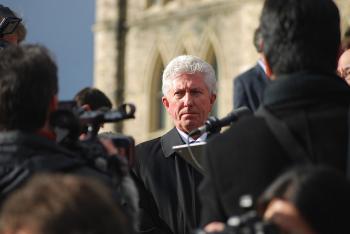With former leader Gilles Duceppe taking over the leadership of the Bloc Québécois (BQ) from Mario Beaulieu, the only party able to threaten the NDP in Quebec has raised its game.
The Trudeau Liberals have failed to gain traction in francophone Quebec; Conservative support has been limited to the Quebec City area; and the NDP looks comfortably ahead across Quebec, a position Duceppe wants to overturn.
NDP strength meant the BQ -- the party that won 49 per cent of the Quebec vote in 1993, and made Lucien Bouchard Leader of the Official Opposition in Ottawa -- was looking at being shut out in the upcoming October 19 federal election.
In response to vanishing electoral prospects, Beaulieu was having trouble recruiting candidates, and over lunch (as reported by Daniel Leblanc in the Globe) invited Duceppe to take his place.
Polling results (Léger–Le Devoir–Le Journal de Montréal) from June 13 show the BQ gaining 10 points with the arrival of Duceppe. At 26-per-cent support, the BQ overtook the Liberals, whose support is concentrated in the Montreal area, and moved to second place behind the NDP.
Despite not having party status in the House of Commons, and hampered by defections and internal splits, the BQ continued to attract support from 16 per cent of the Quebec voting public, or about one-half of convinced sovereignty supporters, before the leadership switch.
Even with a weak, controversial leader in Beaulieu, and with no public presence, the BQ was showing as much support as the Conservatives.
The challenge for Duceppe will be to make sovereignty a federal election issue in a Quebec campaign more likely to be focused on getting rid of Stephen Harper.
A strong delegation of BQ members would make it more likely Harper could continue to govern, since neither the NDP or the Liberals could allow the BQ even a supporting role in a coalition or minority government.
The promotion of sovereignty by Pierre Karl Péladeau (PKP) as part of his accession to the Parti Québécois (PQ) leadership helped encourage the return of Gilles Duceppe to active politics. With assurances of PQ support from PKP, Duceppe decided to resume the position he resigned after losing his own seat, when his party fell from 47 seats to four in the 2011 election.
Coupled with the memories of the near miss in the 1995 referendum provoked by the passing of Jacques Parizeau, the sovereignty movement is determined to make a show of strength by again sending a strong delegation to Ottawa. Winning 12 seats or more and regaining party status in Ottawa would be enough to secure the BQ a place in debates over the future of Quebec.
The last time Duceppe played the sovereignty card, it did not work out for the BQ. In advance of the disastrous 2011 campaign Duceppe announced his party would feature a renewed emphasis on the importance of sovereignty for Quebec. As part of his pre-campaign strategy, Duceppe undertook an international tour to promote sovereignty, speaking in Washington, Paris, and the U.K, in addition to Canadian audiences. The audience at home was not impressed.
Duceppe is a noted trade union activist with a past in the leftist politics of 1970s Montreal. His father, Jean Duceppe, was widely known as a star of the Quebec stage. His personal popularity and standing make him an important figure in Quebec politics.
After Duceppe took over the leadership in 1997, on a day-to-day basis the BQ turned out to be an effective left opposition to the Liberals, succeeding in limiting the ability of Jean Chrétien to win majority support in his home province, despite two campaigns (1997, 2000) in which the Liberals won majority governments.
First entering Parliament through a 1990 byelection in Laurier-Saint-Marie, held to replace the deceased Liberal member Jean-Claude Malépart, a popular defender of social liberalism, Duceppe was the first BQ member elected.
The BQ was born in the House of Commons in 1990 following the resignation of Lucien Bouchard from the Mulroney cabinet over his concerns that the Conservatives were selling out Quebec interests to get a constitutional agreement with all provinces.
In the turmoil surrounding the Meech Lake Accord, Quebec Premier Robert Bourassa suggested to Bouchard that he create a Quebec first voting bloc in Ottawa to support the Quebec provincial Liberal efforts to entrench "distinct society" status in the Constitution.
Both Progressive Conservative and Liberal House of Commons members crossed the floor to join Bouchard in the fledgling BQ.
The BQ presence across the aisles from three successive Chrétien Liberal governments had the unexpected consequence of giving the French language more prominence in House of Commons proceedings than it had ever previously enjoyed.
For sovereignty supporters, the BQ was going to undermine the legitimacy of Ottawa as representative of Quebec by showing how federalism acted against Quebec interests and served to maintain Quebec City in a colonial relationship with the federal government.
The Bloc played a key role in building support for the "Yes" forces in 1995. It made unemployment insurance an issue, capitalizing on how the unemployed were being cheated by a federal government uninterested in their fate. Instead of receiving the payments paid for in insurance premiums, claimants were being refused unemployment insurance benefits.
With skilled members such as Francine Lalonde, Yvan Loubier, and Pierre Paquette on the front bench, the Bloc uncovered how the Chrétien Liberals used unemployment insurance premiums to pay down the federal deficit, while denying benefits to the unemployed.
In its attack on the ill-fated sponsorship program, the BQ destroyed the reputation of the Liberals in Quebec, and in the 2004 election returned in force to the House of Commons, winning 54 seats.
With the BQ using the revelations of the Gomery commission (naively appointed by Paul Martin) to further discredit the Liberals, the Harper Conservatives won a minority government in 2006, and the BQ held on to 51 seats.
In his comeback campaign, Duceppe still has to declare where he will run. Will he choose to take on Tom Mulcair in Outremont, where BQ voters helped turn this Liberal fortress into NDP territory; or will he seek a rematch in his former riding against knowledgeable NDP foreign affairs expert Hélène Laverdière; or will he look for safer grounds?
Gilles Duceppe will face some serious questions from Quebec voters. Each Bloc member elected means one less person able replace a Conservative on the government side of the House of Commons. Why replace a progressive NDP member with a Bloc member? And why bring the sovereignty fight to Ottawa when there are so many serious issues neglected by Harper that need to be addressed by a new government in which Quebec is strongly represented, climate change first among them?
Duncan Cameron is the president of rabble.ca and writes a weekly column on politics and current affairs.
Photo: Stephen Downes/flickr



Comments
Do
Don't